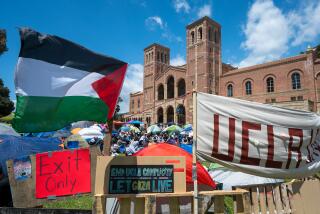Downturn threatens L.A. Jewish seminary
Leaders of a Jewish seminary in Los Angeles are arguing against a proposal by its parent organization that could lead to the closure of the campus as part of a larger financial restructuring.
The head of the Hebrew Union College-Jewish Institute of Religion has raised the possibility of closing two of its three U.S. campuses. The three are in Los Angeles, Cincinnati and New York. In response to the proposal, leaders at the Los Angeles campus have sent a five-page memo to the college-institute’s president, Rabbi David Ellenson, and other key administrators, arguing that a bicoastal arrangement would work best.
The college-institute -- a seminary and graduate school for the Reform movement -- faces a deficit of as much as $8 million through next year because of losses to its endowment and falling income from Reform congregations that supply a major share of its revenue.
In addition to the proposal to close two campuses, the college-institute’s board of governors will also consider a reorganization of its programs, which might allow more than one U.S. campus to continue operations.
The Los Angeles site, local administrators believe, should be included in the ultimate strategy partly because it enjoys a productive relationship with its neighbor, USC. The university pays the seminary campus $1.9 million annually to provide undergraduate courses in Jewish studies to its students, the memo states, adding, “USC is prepared to open discussions about buying or leasing part or all of our property.”
The dean of the Los Angeles campus, Steven F. Windmuel- ler, said the memo was written not to single out his campus above the others but to ensure that Los Angles plays a role in future of the college-institute.
“It was designed to make the case for L.A. as one of the places where Jewish life is growing and critical,” Windmueller said. “In the best of all worlds, that would be our goal: to ensure this kind of presence and continuity.”
Ellenson, who was a professor at the Los Angeles campus for 23 years, said the decision will be made by the board of governors. But he added: “The structure with three stateside campuses operating full programs as they currently do is not sustainable economically for the future.”
Ellenson said a fourth campus, in Jerusalem, will continue to operate but will have to tighten its belt. “It would be unthinkable to eliminate a campus of the HUC in Israel,” he said.
One scholar who studies American Jewry, UCLA history professor David N. Myers, warned against abandoning Los Angeles, a center of Reform Jews, who account for the largest branch of Judaism in this country.
“I still think a presence in Los Angeles is essential to the survival and growth of the [Reform] movement in America because L.A. is the second-largest center of Jewish life demographically . . . and because it’s emerging as an important laboratory of Jewish innovation,” said Myers, who heads the UCLA Center for Jewish Studies.
“For HUC not to be part of that spirit of innovation would harm its capacity to grow and respond to change over time.”
--
More to Read
Sign up for Essential California
The most important California stories and recommendations in your inbox every morning.
You may occasionally receive promotional content from the Los Angeles Times.










